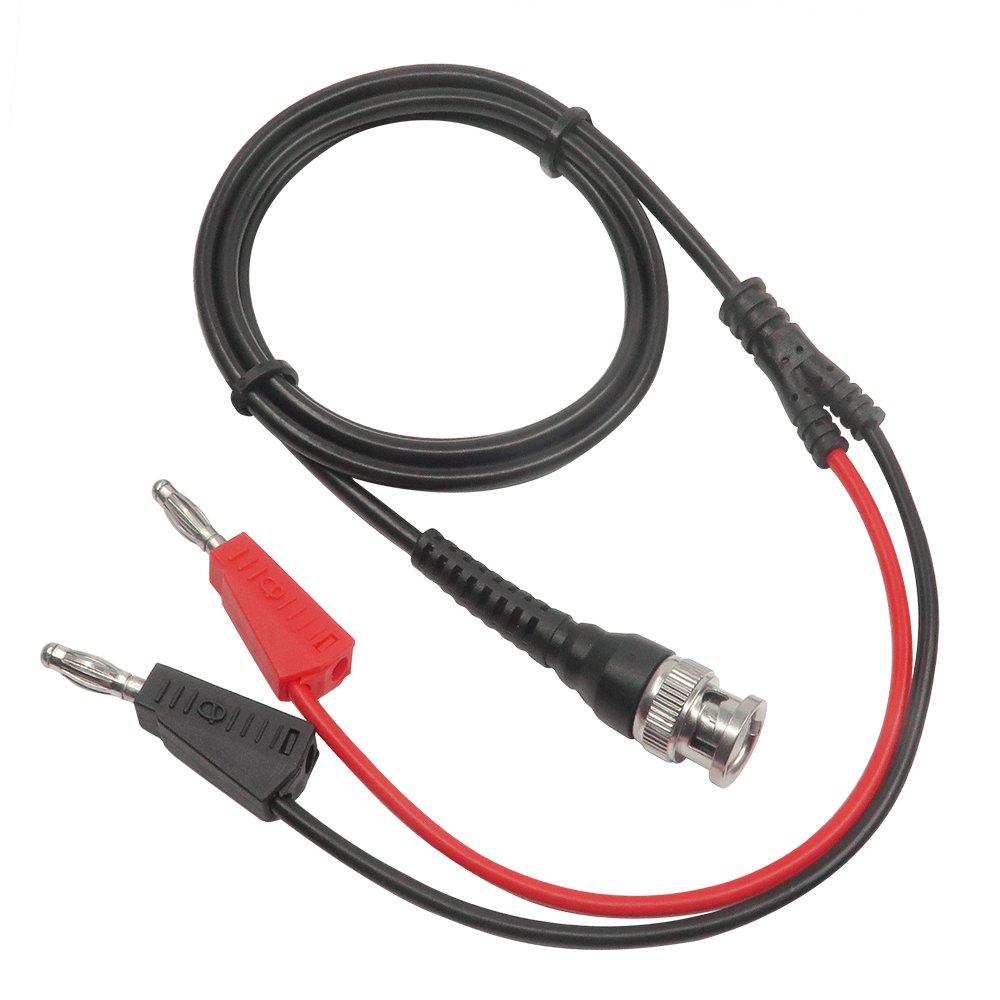
### BNC to Banana Jack Cable Overview
1. **Type**: BNC to Banana Jack Cable
2. **Specifications**:
– **Connector Types**: BNC connector (male) on one end and Banana Jack connector (male) on the other end
– **Cable Length**: Typically ranges from 30 cm to 1 meter, but varies by manufacturer
– **Cable Type**: Often shielded coaxial cable for signal integrity
– **Cable Gauge**: Generally 22 AWG to 24 AWG, depending on the cable’s purpose
3. **Material**:
– **Cable**: Shielded coaxial cable with a central conductor, dielectric insulation, and a shield to prevent signal interference
– **Connectors**: Metal connectors, usually made from brass or other conductive materials, with gold or nickel plating for better conductivity and durability
4. **Functionality**:
– **Signal Transmission**: Transmits signals between devices with BNC and Banana Jack connections, commonly used in electronic testing and measurement applications.
– **Compatibility**: Adapts BNC connectors to devices or equipment with Banana Jack connectors for versatile connectivity.
5. **Features**:
– **Shielded Cable**: Ensures minimal signal loss and protection against electromagnetic interference (EMI).
– **Durable Connectors**: Designed for secure and stable connections with high-quality metal and plating.
– **Flexible Design**: Offers flexibility and ease of use in connecting various types of electronic equipment.
### Typical Uses:
– **Testing Equipment**: Connects test equipment with BNC connectors to devices with Banana Jack inputs for signal testing and measurement.
– **Audio/Video Equipment**: Interfaces between different types of audio or video equipment where one end has a BNC connector and the other has Banana Jacks.
– **Electronic Prototyping**: Used in prototyping and experimentation where various connections are needed.
### Key Benefits:
– **Versatile Connectivity**: Adapts different connector types to work together, expanding connectivity options.
– **Signal Integrity**: Shielded coaxial cable ensures high-quality signal transmission with minimal interference.
– **Durable Construction**: Metal connectors and robust cable design provide reliable performance and long lifespan.
### How to Use:
1. **Connect the BNC End**: Plug the BNC connector into the corresponding BNC port on your device.
2. **Connect the Banana Jack End**: Insert the Banana Jack connectors into the appropriate sockets on the other device or equipment.
3. **Secure Connections**: Ensure both connections are secure to prevent signal loss or disconnection.
4. **Verify Signal Transmission**: Test the setup to confirm that signals are being transmitted correctly between devices.
### Example Applications:
– **Laboratory Testing**: Connects test equipment to measurement devices in a lab setting.
– **Audio/Video Setup**: Interfaces different pieces of audio or video equipment.
– **Educational Projects**: Used in educational settings for demonstrating electronic circuits and signal flow.
### Installation Tips:
– **Check Compatibility**: Ensure the cable length and connector types match the requirements of your equipment.
– **Handle with Care**: Avoid bending or twisting the cable excessively to prevent damage.
– **Clean Connectors**: Keep the connectors clean and free of debris for optimal performance.
### Advantages:
– **Enhanced Connectivity**: Allows for versatile connections between different types of equipment.
– **High-Quality Transmission**: Shielded cable provides reliable and clear signal transmission.
– **Robust Design**: Durable connectors and cable construction ensure long-term use.
The BNC to Banana Jack Cable is a practical accessory for connecting and interfacing various types of electronic equipment, offering reliable signal transmission and versatile connectivity solutions.


Reviews
Clear filtersThere are no reviews yet.